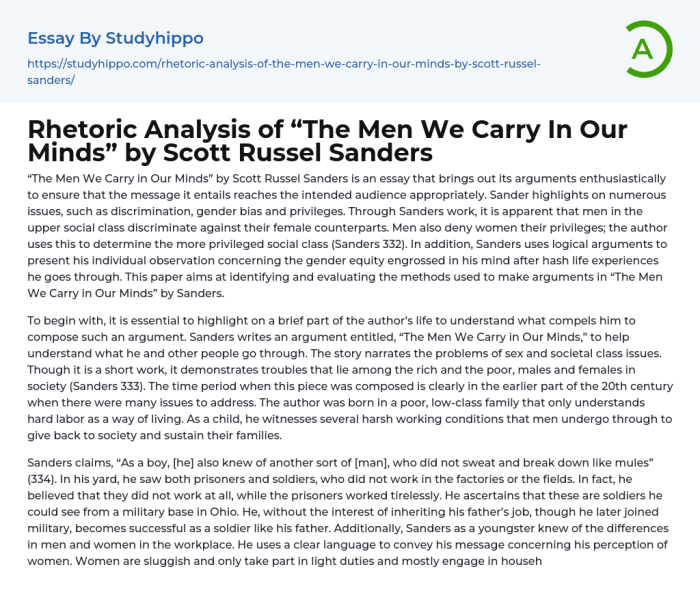The men we carry in our minds shape our perceptions, behaviors, and society. This exploration delves into the profound impact of internalized masculinity, revealing its pervasive influence and the urgent need for a more inclusive and equitable world.
Internalized masculinity, with its rigid norms and expectations, can have both positive and negative consequences. It can foster strength and resilience but also lead to emotional suppression and toxic behaviors. Media and popular culture play a significant role in perpetuating these images, shaping the way we view and interact with men.
Defining “The Men We Carry in Our Minds”

The phrase “The Men We Carry in Our Minds” can be interpreted in both literal and metaphorical senses. Literally, it refers to the men we remember, whether they are real or fictional, who have influenced our lives in some way.
Metaphorically, it represents the collective ideas, values, and beliefs about men that we carry within us, consciously or unconsciously.
Individual Level
On an individual level, the men we carry in our minds can shape our self-perception, our relationships, and our behavior. For example, a woman who has had a positive experience with a father figure may be more likely to have healthy relationships with men, while a woman who has had a negative experience with a father figure may be more likely to have difficulty trusting men.
Societal Level, The men we carry in our minds
At a societal level, the men we carry in our minds can influence our cultural norms and values. For example, in a society where men are seen as strong and powerful, women may be less likely to be seen as capable leaders.
Conversely, in a society where men are seen as more nurturing and compassionate, women may be more likely to be seen as capable caregivers.
The Impact of Internalized Masculinity

Internalized masculinity refers to the adoption and embodiment of traditional masculine norms and values. These norms often emphasize traits such as stoicism, emotional suppression, aggression, and dominance. Internalized masculinity can have a profound impact on our thoughts, feelings, and behaviors, shaping who we are and how we interact with the world.
Adhering to traditional masculine norms can have both positive and negative consequences. On the positive side, it can lead to increased confidence, assertiveness, and a sense of purpose. However, it can also lead to negative outcomes such as emotional repression, difficulty expressing vulnerability, and an increased risk of engaging in risky or violent behaviors.
Positive Consequences
- Increased confidence and self-esteem
- Enhanced assertiveness and leadership skills
- Stronger sense of purpose and direction
- Greater resilience in the face of adversity
Negative Consequences
- Emotional repression and difficulty expressing vulnerability
- Increased risk of engaging in risky or violent behaviors
- Difficulty forming and maintaining close relationships
- Negative impact on mental and physical health
Exploring the Role of Media and Popular Culture: The Men We Carry In Our Minds

Media and popular culture play a significant role in shaping our perceptions of masculinity. From movies and TV shows to music and advertising, these platforms often perpetuate and reinforce narrow and stereotypical images of what it means to be a man.
The men we carry in our minds are like the colored part of eye crossword , a small but significant part of our overall perception. Just as the colored part of the eye can reveal a person’s mood or intentions, the men we carry in our minds can shape our thoughts and actions.
They are the memories, the lessons, and the dreams that we carry with us, influencing who we are and who we become.
These representations have a profound impact on individuals, especially young boys and men, who may internalize these messages and strive to conform to these idealized notions of masculinity. This can lead to a range of negative consequences, including pressure to suppress emotions, engage in risky behaviors, and perpetuate harmful gender norms.
Media Representations of Masculinity
- Action heroes and tough guys:These characters are often portrayed as strong, stoic, and fearless, emphasizing physical prowess and aggression as defining traits of masculinity.
- Playboys and womanizers:These characters are portrayed as sexually promiscuous and objectify women, reinforcing the idea that masculinity is tied to sexual conquest.
- Intellectuals and sensitive men:While less common, these characters are often depicted as weak or effeminate, suggesting that intelligence and emotional sensitivity are not typically associated with masculinity.
The Importance of Empathy and Perspective-Taking

Understanding the experiences of men who challenge traditional masculine norms requires empathy, the ability to step into their shoes and see the world from their perspective. Empathy allows us to comprehend their struggles, motivations, and the unique challenges they face in a society that often marginalizes those who deviate from conventional expectations.
Developing empathy involves actively listening to their stories, seeking out diverse perspectives, and challenging our own assumptions about masculinity. It means recognizing the intersectionality of identities, understanding how race, class, sexual orientation, and other factors shape men’s experiences.
Strategies for Developing Empathy
- Active listening:Engage in meaningful conversations, listening attentively to men’s experiences and perspectives without judgment.
- Seek out diverse perspectives:Make an effort to interact with men from different backgrounds, cultures, and identities to broaden our understanding of masculinity.
- Challenge assumptions:Question our preconceived notions about what it means to be a “real man” and be open to alternative definitions of masculinity.
- Reflect on our own experiences:Examine our own socialization as men and identify the ways in which traditional masculine norms have influenced our thoughts and behaviors.
Creating a More Inclusive and Equitable Society
To foster a more inclusive and equitable society, it is crucial to challenge traditional masculine norms that perpetuate gender inequality. This requires a multifaceted approach involving education, advocacy, and policy changes.
Education plays a vital role in shaping attitudes and beliefs. By incorporating gender equality principles into curricula and promoting critical thinking, we can challenge stereotypes and encourage students to question harmful norms. Additionally, workshops and training programs can raise awareness about the impact of traditional masculinity and provide tools for individuals to challenge these norms in their own lives.
Advocacy and Policy Changes
Advocacy campaigns can raise public awareness about gender inequality and challenge harmful stereotypes. By using social media, organizing protests, and lobbying policymakers, advocates can pressure institutions to adopt more equitable policies. Policy changes, such as paid parental leave, flexible work arrangements, and anti-discrimination laws, can create a more supportive environment for individuals of all genders.
Quick FAQs
What is the significance of “the men we carry in our minds”?
This phrase refers to the internalized beliefs and expectations we hold about men, which shape our thoughts, feelings, and behaviors towards them.
How does internalized masculinity impact individuals?
It can lead to emotional suppression, difficulty expressing vulnerability, and a drive to conform to societal expectations of strength and dominance.
What is the role of media in shaping masculinity?
Media often portrays narrow and stereotypical images of masculinity, reinforcing traditional norms and limiting the representation of diverse masculine identities.